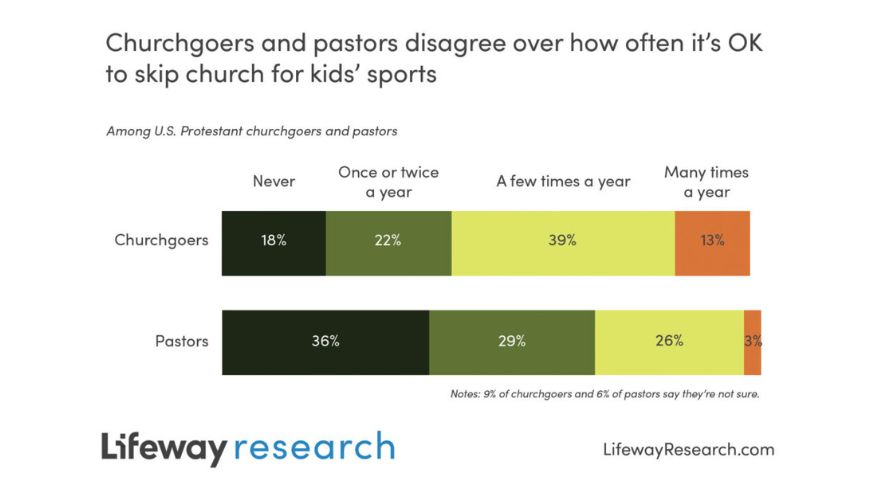
BRENTWOOD, Tenn. (BP) — Growing up, Aaron Bryant may have dreamed of playing in the NFL, but his family would’ve never dreamed of skipping church.
Bryant was part of the Tennessee Titans when they made the Super Bowl in 1999. Despite playing multiple sports in high school, he says he rarely missed church services because of it. “Primarily, my parents prioritized corporate worship for our family and established a precedent that our time with our church family on Sunday mornings was more important than anything else,” he said.
Today Bryant is the teaching pastor at the Church at Avenue South in Nashville, and like many pastors, sees some families missing because of sports.
A Lifeway Research study of both U.S. Protestant pastors and churchgoers found most in both groups believe it’s OK to miss church occasionally for a kid’s game or travel sporting event, but those in the pews are more lax on the issue than those behind the pulpit.
“Our culture no longer expects large numbers of people to be in church each week, so increasingly other events are also scheduled on Sundays,” said Scott McConnell, executive director of Lifeway Research. “Families whose kids play sports often have to choose between attending church or being with their team.”

Pastoral perspective
More than 1 in 3 U.S. Protestant pastors (36%) say it’s never OK to skip a weekly worship service for kids’ games or travel sporting events, but almost 3 in 5 (58%) see at least some allowance for missing in those circumstances. Around 3 in 10 (29%) believe it’s acceptable once or twice a year. A quarter (26%) say a few times a year, while 3% say many times a year. Another 6% say they aren’t sure.
Pastors 65 and older (43%) are among the most likely to say it’s never acceptable. Evangelical pastors are more likely than mainline pastors to say never (40% v. 28%). Those at the smallest churches, less than 50 in attendance, are also more likely than pastors at the largest churches, 250 or more, to believe skipping for sports is never OK (38% v. 24%).
Regardless of how accepting their pastor may be, Bryant said families often feel overwhelmed by all their tasks and events and feel as if they need to make a choice. “Unfortunately, for the children, when they choose to eliminate something from their schedules, it’s often corporate worship involvement so they can continue to remain involved with team sports,” he said.
Recent research indicates this may have accelerated for families after the pandemic. A report published by the Aspen Institute found children ages 6-18 spent an average of 13.6 hours per week playing sports, including 4.6 hours of practice and 3.7 hours of competition before COVID-19. While those all dropped during the pandemic, by September 2022, children were involved in sports for 16.6 hours per week, with 8.1 hours of practice and 3.7 hours of competition. According to Wintergreen Research, travel sports has grown into a $39 billion-a-year industry and is projected to reach $72 billion by 2029.
Despite some potential conflicts, Bryant said he and his wife encourage their children to be involved in sports and extra-curricular activities, but they discuss together how it might affect their family. When advising other parents, Bryant said he would encourage them to affirm their child’s desire to be involved in sports even if it does involve some travel. “Sports mirror the game of life, and our kids can learn perseverance, accountability, hard work, humility, teamwork and much more from sports,” he said. “However, I would caution all parents to count the cost and the impact that sports will have on their child’s spiritual development, the impact it will have on their marriage, finances, etc.”
View from the pews
Based on their perspective on missing services, many churchgoers see the potential impact differently than their pastors. Fewer than 1 in 5 U.S. Protestant churchgoers (18%) say it is never OK to skip church for kids’ sports. Around 3 in 4 (74%) believe it’s acceptable at least occasionally, including 22% who say once or twice a year, 39% a few times a year and 13% many times a year. Another 9% say they aren’t sure.
As it was with pastors, age is a factor for how likely a churchgoer is to see missing church for sports as OK. Those 50 and older are more likely than adults under 35 to say it’s never acceptable (20% v. 12%). Churchgoers 65 and older (7%) are the least likely to believe it’s OK to skip many times a year, while those under 35 (26%) are the most likely.
Additionally, churchgoers who attend more frequently are less accepting of skipping because of sporting events. Those who attend one to three times a month (45%) are more likely than those who attend four or more times (35%) to say missing a few times a year is OK. Meanwhile, those less frequent attenders (12%) are less likely than those who attend more often (22%) to say it’s never acceptable to miss because of a child’s game.
For churchgoers who do decide to miss because of sports, Bryant encourages the whole family to capitalize on the opportunity. “Perhaps you will be able to share the gospel with someone on the team, or another parent, who would otherwise never attend a worship service,” he said. “But those gospel engagements won’t happen accidentally, so you’ll have to be proactive and intentional.”
When he’s coaching sports, Frankie Creel says this is his mindset. Creel, an elder at CrossLife Church in Spartanburg, S.C., coaches high school sports and used to coach a travel softball team. His daughter is still part of a travel team. “If I am coaching, I use it as an opportunity to talk to the ladies about their identity in Christ and use it as a time of study and discipleship,” he said.
They try to avoid Sunday games, but there are occasional major tournaments that lead to their missing four to five Sundays during the summer. “As long as it is not an absurd amount of time, I am OK,” he said.
Creel encouraged parents to ask themselves why they want to be involved in sports before committing. He said for younger players, he would avoid travel as much as possible. Camps and one-day tournaments can help those athletes continue to develop. Once the child reaches 10th grade and wants to play beyond high school, he said those larger tournaments become more necessary.
For Creel, churches can serve parents of travel sports athletes by creating “resources that encourage parents to have Christ-centered conversations with their kids, whether its online sermons, books or just tools to help disciple the child.”
Bryant says they are working to equip and encourage parents at the Church at Avenue South, and they’ve seen some results. “Some parents are now embracing more than ever that all 168 hours in a week are important for reinforcing biblical truths, not just taking their children to church for one hour of corporate worship on Sundays,” he said. “Some are repurposing the time they have with their children, whether in the car during the trip or around the team hotel to invest the gospel in their children.”
For more information, view the pastors’ report, the churchgoers’ report and visit LifewayResearch.com.
Methodology
The phone survey of 1,004 Protestant pastors was conducted Aug. 29, 2023 – Sept. 20, 2023. The calling list was a stratified random sample, drawn from a list of all Protestant churches. Quotas were used for church size. Each interview was conducted with the senior pastor, minister or priest at the church. Responses were weighted by region and church size to reflect the population more accurately. The completed sample is 1,004 surveys. The sample provides 95% confidence that the sampling error does not exceed plus or minus 3.2%. This margin of error accounts for the effect of weighting. Margins of error are higher in sub-groups.
The online survey of 1,008 American Protestant churchgoers was conducted Sept. 19-29, 2023, using a national pre-recruited panel. Respondents were screened to include those who identified as Protestant/non-denominational and attend religious services at least once a month. Quotas and slight weights were used to balance gender, age, region, ethnicity, education and religion to reflect the population more accurately. The completed sample is 1,008 surveys. The sample provides 95% confidence that the sampling error from the panel does not exceed plus or minus 3.2%. This margin of error accounts for the effect of weighting. Margins of error are higher in sub-groups.
(EDITOR’S NOTE — Aaron Earls is a writer for LifeWay Christian Resources.)


